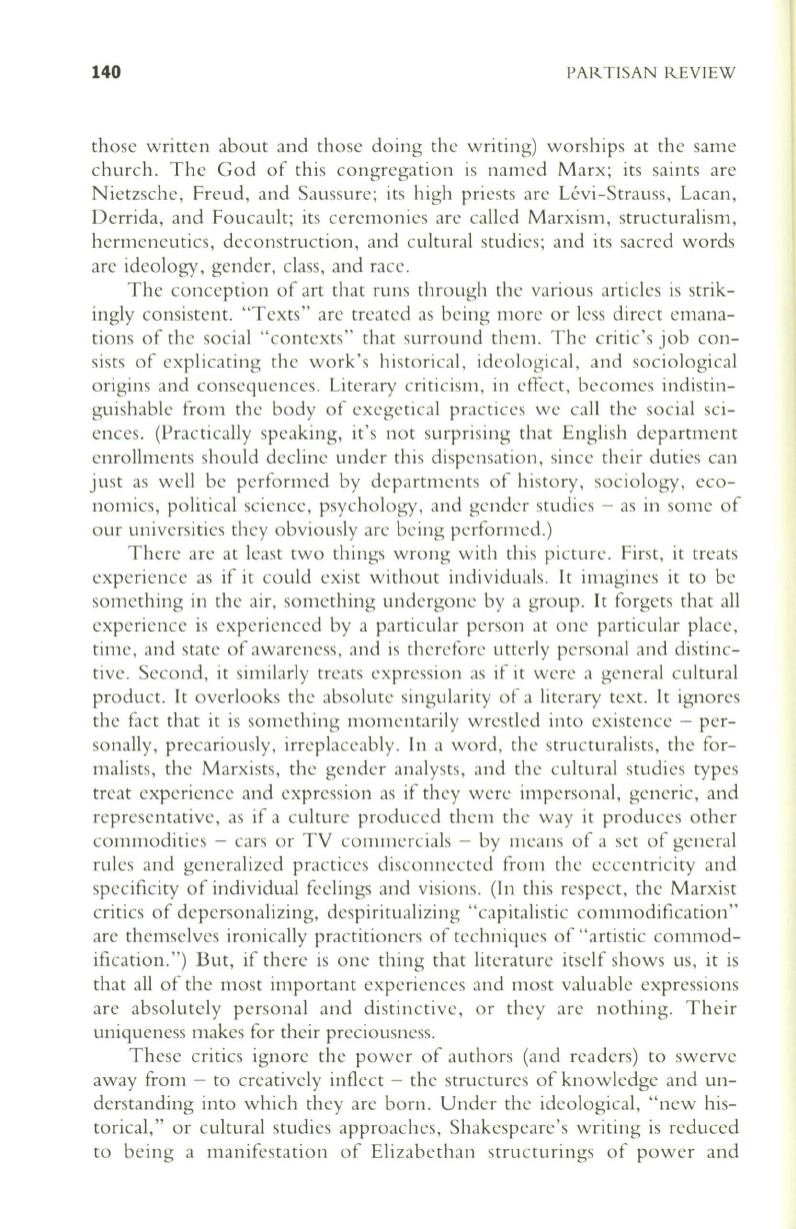
140
PARTISAN REVIEW
those written about and those doing the writing) worships at the same
church. The God of this congregation is named Marx; its saints are
Nietzsche, Freud, and Saussure; its high priests are Levi-Strauss, Lacan,
Derrida, and Foucault; its ceremonies are called Marxism, structuralism,
hermeneutics, deconstruction, and cultural studies; and its sacred words
are ideology, gender, class, and race.
The conception of art that runs through the various articles is strik–
ingly consistent. "Texts" are treated as being more or less direct emana–
tions of the social "contexts" that surround them. The critic's job con–
sists of explicating the work's historical, ideological, and sociological
origins and consequences. Literary criticism, in effect, becomes indistin–
guishable from the body of exegetical practices we call the social sci–
ences. (Practically speaking, it's not surprising that English department
enrollments should decline under this dispensation, since their duties can
just as well be performed by departments of history, sociology, eco–
nomics, political science, psychology, and gender studies - as in some of
our universities they obviously are being performed.)
There are at least two things wrong with this picture. First, it treats
experience as if it could exist without individuals. It imagines it to be
something in the air, something undergone by a group. It forgets that all
experience is experienced by a particular person at one particular place,
time, and state of awareness, and is therefore utterly personal and distinc–
tive. Second, it similarly treats expression as if it were a general cultural
product. It overlooks the absolute singularity of a literary text. It ignores
the fact that it is something momentarily wrestled into existence - per–
sonally, precariously, irreplaceably. In a word, the structuralists, the for–
malists, the Marxists, the gender analysts, and the cultural studies types
treat experience and expression as if they were impersonal, generic, and
representative, as if a culture produced them the way it produces other
commodities - cars or TV commercials - by means of a set of general
rules and generalized practices disconnected from the eccentricity and
specificity of individual feelings and visions. (In this respect, the Marxist
critics of depersonalizing, despiritualizing "capitalistic commodification"
are themselves ironically practitioners of techniques of "artistic commod–
ification.") But, if there is one thing that literature itself shows us, it is
that all of the most important experiences and most valuable expressions
are absolutely personal and distinctive, or they are nothing. Their
uniqueness makes for their preciousness.
These critics ignore the power of authors (and readers) to swerve
away from - to creatively inflect - the structures of knowledge and un–
derstanding into which they are born. Under the ideological, "new his–
torical," or cultural studies approaches, Shakespeare's writing is reduced
to being a manifestation of Elizabethan structurings of power and


